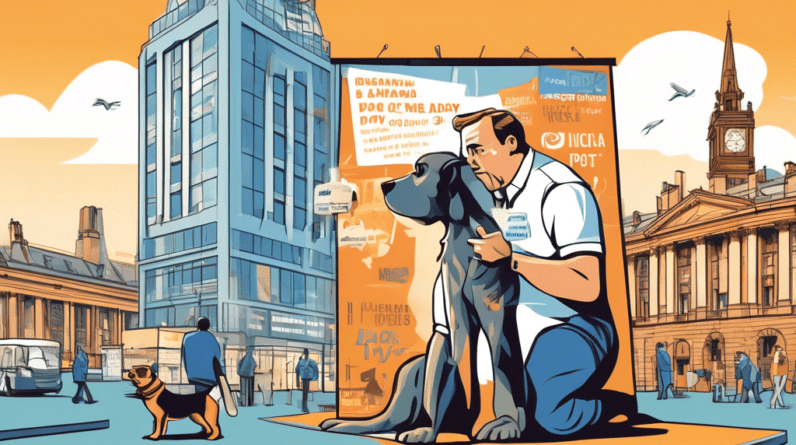
Nonprofit Service Dog Training Organizations Face Mounting Challenges
Funding Shortfalls and Increased Demand Put Strain on Vital Services
Nonprofit service dog training organizations play a critical role in providing life-changing assistance to individuals with disabilities. These organizations train and pair highly skilled service dogs with people facing a wide range of challenges, including mobility impairments, visual or hearing impairments, psychiatric disabilities, and more. The bond between a service dog and their handler is unbreakable, offering independence, companionship, and a newfound sense of freedom.
However, behind the scenes of these heartwarming success stories lies a complex web of challenges that threaten the sustainability and impact of nonprofit service dog training organizations. From securing adequate funding to navigating the intricacies of breeding and training, these organizations constantly strive to overcome obstacles and fulfill their mission.
Financial Hurdles: The Constant Struggle for Sustainability
One of the most significant challenges faced by nonprofit service dog training organizations is securing consistent and adequate funding. The process of breeding, raising, training, and placing a single service dog can cost tens of thousands of dollars, and these organizations rely heavily on donations, grants, and fundraising events to cover these expenses.
Unlike for-profit service dog providers, nonprofits are committed to making their services accessible to all individuals in need, regardless of their financial situation. This often means providing dogs at little to no cost to the recipient, further straining limited financial resources. The competitive nature of grant funding and the fluctuating landscape of individual donations add to the financial uncertainty faced by these organizations.
The Long Road to a Service Dog: Time and Expertise Required
Training a service dog is not a quick or easy process. It requires a significant investment of time, expertise, and specialized resources. From selecting dogs with the right temperament and aptitude to providing comprehensive training tailored to the specific needs of the handler, every step in the process is crucial.
Nonprofits often rely on a combination of dedicated staff trainers and volunteers to handle the day-to-day responsibilities of dog care, socialization, and training. Finding and retaining skilled trainers, particularly those with expertise in specific disabilities, can be a challenge. Additionally, the training process itself can take anywhere from one to two years, requiring sustained commitment and ongoing support.
Navigating the Complexities of Breeding and Healthcare
Many nonprofit service dog training organizations have dedicated breeding programs to ensure a steady supply of healthy and genetically sound puppies. However, breeding dogs comes with its own set of challenges and expenses. Maintaining the health and well-being of breeding dogs, providing appropriate prenatal and postnatal care, and conducting genetic testing all contribute to the overall costs.
Furthermore, providing comprehensive veterinary care throughout a service dog’s life is essential. Regular checkups, vaccinations, and preventative care, as well as the potential for unexpected illnesses or injuries, require substantial financial resources. Nonprofits often rely on partnerships with veterinary clinics or the generosity of volunteer veterinarians to help manage these costs.
Rising Demand and Limited Resources: A Growing Challenge
The demand for service dogs continues to rise as awareness of their life-changing benefits grows and the Americans with Disabilities Act (ADA) evolves. Unfortunately, the resources available to nonprofit service dog training organizations have not kept pace with this increasing demand. This disparity often results in longer waitlists for individuals seeking a service dog, potentially delaying access to much-needed support.
The COVID-19 pandemic has exacerbated these challenges, disrupting fundraising efforts, limiting access to training facilities, and increasing the need for service dogs among individuals facing pandemic-related disabilities. The long-term impact of the pandemic on nonprofit service dog organizations remains to be seen, but the need for increased support and funding is undeniable.
Advocating for Change: Supporting Nonprofit Service Dog Organizations
Despite the numerous challenges they face, nonprofit service dog training organizations remain dedicated to their mission of empowering individuals with disabilities. By raising awareness about the vital role these organizations play, advocating for policies that support their work, and providing financial and volunteer support, we can help ensure that they can continue to change lives, one paw print at a time.
How You Can Make a Difference
There are many ways to support nonprofit service dog training organizations. Consider making a one-time or recurring donation, volunteering your time or skills, spreading the word about their mission, or advocating for policies that promote accessibility and support individuals with disabilities. Every effort, big or small, can make a difference in the lives of those who rely on service dogs for independence and companionship.






